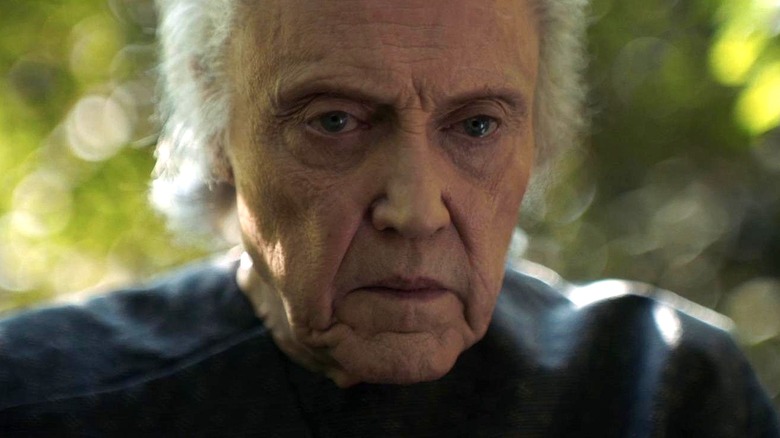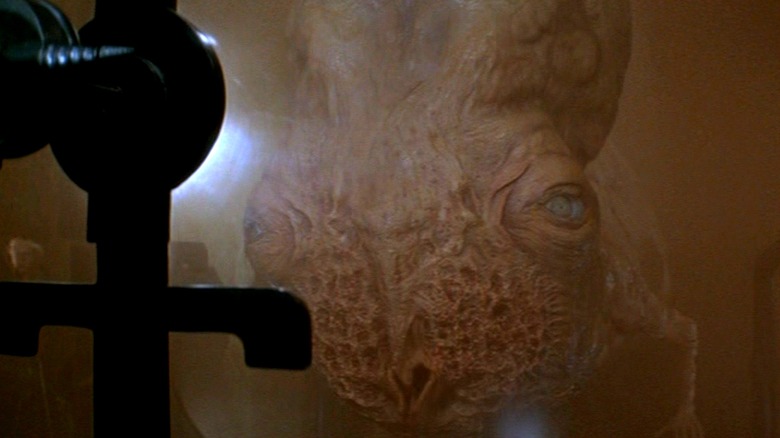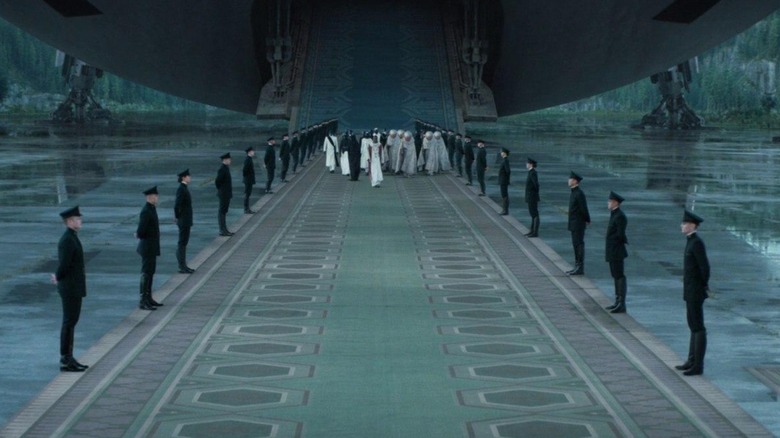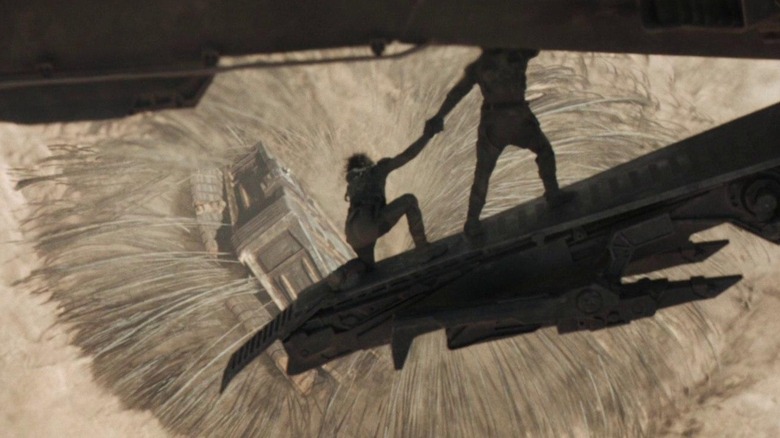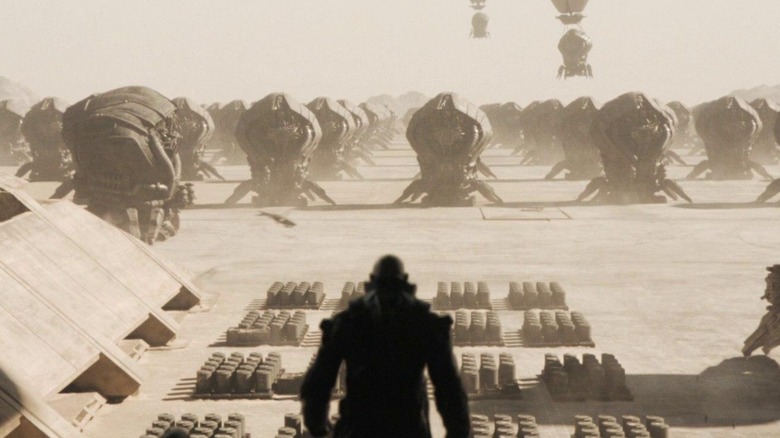What Does The Spice From Dune Do?
Ever since Frank Herbert's novel "Dune" was published in 1965, sci-fi fans have been dreaming of the deserts on Arrakis. "Dune" influenced some of the greatest sci-fi franchises of all time while also inspiring dozens of sequels and multiple films set in its own universe. The entire "Dune" timeline spans thousands of years, and the books follow dozens of different characters. Throughout the story, there are only two constants: Arrakis and the spice melange.
The first "Dune" novel introduces the spice, the substance that runs the galactic economy. Melange is an extremely rare material that can only be found deep in the deserts on Arrakis, but humanity is more than willing to put in the work required to get it. That's because spice is more valuable than anything else in the entire galaxy, which means that regardless of where the Emperor lives, Arrakis is the real center of power in the Empire.
The spice is a borderline magical substance in "Dune" with a slew of special properties. In one scene, the spice might be causing an interstellar war, and in the next, someone might be casually stirring it into their morning coffee. Once you really understand everything that the spice can do, it's easy to see why empires have risen and fallen while fighting for control of it.
Sometimes it really is just a spice
The spice melange is one of the rarest and most elusive materials in the entire galaxy. Millions have warred and died while attempting to gain control of the spice, and the Empire itself owes its very existence to the spice's mysterious powers. Don't let all that grandeur fool you, though. Despite all of its borderline mystical properties, melange really is just a spice, and the people of Arrakis have been using it as such for a long time.
Melange is a core part of life for the Fremen living on Arrakis, and they've all been consuming the spice since birth. The "Dune" books don't spend much time examining the cooking habits and family recipes of the Fremen, and the movies look at this even less. That said, there's a small detail you might have missed in "Dune: Part 1" if you aren't familiar with what the books have to say about spice-seasoned food and drink.
Just before the Harkonnens attack the Fremen and kill Duncan Idaho, director Denis Villeneuve snuck in a quick shot of some Fremen soldiers making a drink with a small, teapot-like device. Book readers recognize that the Fremen are making a special kind of coffee, a drink brewed with human spit because the desert doesn't have much water. People have to do strange things to survive out in the desert, but at least the spice helps make even their most questionable food a bit more palatable. According to Lady Jessica in the first "Dune" book, the spice tastes somewhat like cinnamon, so the saliva coffee might actually taste good.
It's a cultural touchstone
Spice is everywhere on Arrakis, so, naturally, the Fremen have incorporated it into almost every aspect of their culture. The Fremen are intimately connected with the natural world of Arrakis, in large part because their survival depends on getting along with nature. Living in a desert surrounded by hungry worms the size of large buildings isn't easy, and the Fremen have a long history of using every resource available to them, including the spice, to keep their society going.
We've already pointed out how the Fremen use the spice in their cooking, but they've found plenty of other uses for it as well. Spice-infused stone forms the walls of Fremen dwellings, and they know how to weave special spice fibers that can be made into everything from paper to clothing. Spice is such a common part of life on Arrakis that every Fremen, even the youngest members of the tribe, have pale blue eyes – a sign that someone is chemically dependent on the spice.
Aside from everyday items, spice is also a prominent part of the most important Fremen ritual. Women can become Reverend Mothers by drinking the Water of Life, which contains spice and induces intense hallucinations. When Lady Jessica becomes a Reverend Mother, the Fremen celebrate with what they call a "spice orgy" — essentially a party where everyone drinks some of the spice-infused water.
It can extend a person's life
The Empire runs on spice, but the intergalactic community isn't interested in using it to create clothing or to add a nice cinnamon flavor to their coffees. The main reason that spice became the most valuable substance known to humanity is because it has incredible medicinal properties. The Fremen know how to use it to help heal wounds and cure various ailments, but the wealthy elites of the Empire have less niche uses in mind.
By ingesting the spice on a regular basis, a person can artificially extend their life. The "Dune" books don't explicitly state how much time it can add to a person's life span, but characters like Baron Harkonnen and the Emperor are regularly described as appearing to be decades younger than they actually are. The spice can't make someone immortal, but everyone in the galaxy still wants it. The wealthy elites of the Empire repeatedly show that they're willing to wage bloody wars to secure enough to keep themselves alive as long as possible.
Unfortunately, regular spice consumption comes with a price. Eventually, consuming spice will turn your eyes blue, and you'll become reliant on the substance. At that point, it will still extend your life, but if you ever stop consuming it, you'll die.
It can give you visions of the future
An extended lifespan isn't the only side effect that someone experiences from ingesting the spice. In addition to being a magical cure-all and a genuine seasoning, melange is also a psychoactive drug. In small doses, like the amount that would get mixed into a cup of coffee, someone might not feel its effects, but taking enough of it can induce hallucinations.
In "Dune: Part 1," we witness some of these hallucinations from the perspective of Paul Atreides (Timothée Chalamet). The first time he goes out into the desert, he gets caught up in a swirl of spice-infused sand and has an almost out-of-body experience. Anyone who takes enough spice will experience some strange emotions and visual effects, but Paul actually gets to experience an extra level of its narcotic effects.
The hallucinations that the spice induces aren't entirely meaningless. The spice lets people, to a certain extent, see glimpses of the future. Because of Paul's bloodline, he's able to tap into that special sight more than most, and he sees a Golden Path that all but lays out the entire future of the galaxy. Most people won't come to understand every twist of fate by ingesting spice, but they will get some insights into their future. That's yet another reason why the spice is so valuable and so important to the Fremen who've built their culture around it.
The spice is a key element in space travel
When a regular person consumes an excessive amount of spice, they'll have a trippy experience filled with some memorable hallucinations. When Paul Atreides takes it, he sees the entire path of history stretching out before him. Somewhere between those two extremes are the members of the Spacing Guild who've found arguably the most practical use for spice that there is.
Spacing Guild Navigators are the only people who can safely transport ships across the galaxy. The big problem with space travel in the "Dune" universe is that the galaxy is so unimaginably large that it's almost impossible to fully navigate. Every object in space is constantly moving, so to successfully get from Point A to Point B, someone would basically need to be able to see the future. This is where the spice comes in.
Spacing Guild Navigators are constantly inhaling spice gas. In David Lynch's ill-fated "Dune" movie, the Navigators were imagined as strange creatures living in smoke-filled tanks. Their physical description has changed from one iteration of the story to another, but their relationship to the spice has remained the same. They use its precognitive properties to visualize safe paths through the depths of space, and because the Navigators are the only beings who can reliably make use of it, they have a monopoly on space travel.
The galactic economy is driven by spice
The spice's life-extending properties might be why certain individuals value it so highly, but the spice's connection to the Spacing Guild is really what makes it such an important substance. Without it, Navigators couldn't safely traverse the stars, and intergalactic trade would come to a screeching halt. The Emperor wouldn't be able to maintain control over any of the Great Houses, and the entire galaxy would fall into chaos. One of the truisms of the "Dune" franchise is that whoever controls the spice controls the universe.
More than one war has been fought over control of the spice. In fact, a battle for the spice is one of the driving forces behind the original "Dune" novel and its many adaptations. The Atreides and the Harkonnens are fighting so intensely over Arrakis because whoever controls the planet owns the entire galaxy's spice supply. In the beginning of "Dune," the Harkonnens are conspiring with the Emperor, not just to kill the Atreides, but also to cement their control over the spice. At the end of "Dune," Paul is able to take control of the entire empire because by ruling over Arrakis, he already controls the entire galaxy's economy, making him more powerful than the Emperor himself.
The spice can cause physical transformations
In some ways, the spice in "Dune" is whatever the story needs it to be. It can be an ordinary, everyday substance, or it can be the resource that the entire galaxy depends upon. It can induce visions of the future, and, in some extremely rare cases, it can cause dramatic physical transformations. Ask any hardcore "Dune" fan about what happens in the books, and they'll tell you that things eventually get really weird. They're not wrong — and the spice is at the center of all the weirdness.
In "Children of Dune," Paul Atreides's son, Leto II, begins an incredible journey. Leto is about the age Paul was at the beginning of "Dune," and he's starting to see visions of Paul's Golden Path. Realizing that he needs to make an incredible sacrifice, he goes to the mythical lost Fremen sietch Jacurutu to do it. There, Leto finds some sandtrout, the baby versions of sandworms, and, using the power of his ancestry and the spice in his blood, he causes the sandtrout to fuse into his own skin.
As "Children of Dune" wraps up, Leto is a semi-ordinary teen boy who has incredible durability and strength thanks to the layer of worm skin that surrounds his body. When the very next book in the series, "God Emperor of Dune," picks up thousands of years later, Leto's entire body has transformed into a giant worm. That transformation won't happen to every spice user, but Leto needed the spice to make it happen to him.
Where does spice really come from?
We've established why the spice is so important to the people of the "Dune" universe, but why is it only found on Arrakis? Part of the answer is that its extreme rarity makes for a really good story, but the "Dune" novels actually give a specific answer for why no other planet in the universe has any. It all has to do with the true stars of the "Dune" franchise: the sandworms.
Before Arrakis's worms become full-sized monsters, they're tiny little sandtrout. While in this stage of their lifecycle, they excrete fluid that mixes with the very small amount of water beneath Arrakis's surface to create a sort of mineral deposit that will eventually turn into spice. Those pre-spice deposits eventually get pushed to the desert surface, and there the heat of the planet's atmosphere transforms the masses into their final form.
In "God Emperor of Dune," which takes place thousands of years after the original novel, terraforming has transformed the surface of Arrakis and made the planet largely habitable. Because of that, there are almost no sandworms, and therefore no spice, on the planet. The only spice left is held by Emperor Leto II, but at the end of that novel, Leto's body is submerged in water, killing him and releasing new sandtrout into the world. In all the books that follow, you could say that the spice came directly from Leto's body.
How is artificial spice different from natural spice?
For thousands and thousands of years, humanity was dependent on the spice to expand out into the stars. That all ended when Leto II took control of the Empire. In "God Emperor of Dune," we learn that Leto withheld the spice from humanity and forced people across the galaxy to live through a new dark age because of something he saw in his visions of the future. At the end of that book, Leto's reign is ended, and spice trade can once again get started — but the universe doesn't go back to its old ways.
Throughout history, many societies tried to break Arrakis's monopoly on spice by creating artificial alternatives, but no one succeeded until after Leto II's death. In "Heretics of Dune" we learn that an order called the Bene Tleilax has managed to create an alternative. This artificial spice is able to provide all the same material benefits as natural spice, but the Bene Tleilax's incredible discovery hardly matters. Leto II's reign transformed intergalactic society so much that an artificial version isn't nearly as valuable as it might have been during the time of Paul Atreides. People aren't quite as reliant on spice as they once were, and the Bene Tleilax aren't able to use their artificial spice to become the new rulers of the galaxy. In fact, by the time the next book in the series, "Chapterhouse Dune," begins, the Bene Tleilax have been destroyed, despite their valuable discovery.
What's the difference between spice melange and Star Wars spice?
Did you know that the spice exists in "Star Wars," too? There are a few references to the substance throughout the franchise's canon. "The Mandalorian" referenced spice's hallucinogenic properties somewhat recently, and in "Star Wars: Episode IX – The Rise of Skywalker," Poe Dameron's friends are shocked and appalled to learn that he was once a spice trafficker.
Of course, long before George Lucas began working on his epic space opera, "Dune" had established itself as a sci-fi classic. It's hard to imagine that the spice in "Star Wars" is anything but a reference to Frank Herbert's series, especially considering the similarities between the two. In "Star Wars," spice is a recreational drug that induces hallucinations in people who consume it, and while there hasn't been any indication that characters in the "Star Wars" universe are getting glimpses of the future during their hallucinations, nothing's impossible.



